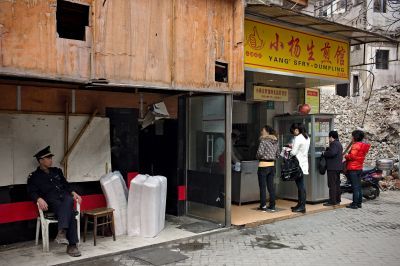Shanghai demolishes historic spots before Expo

Your support helps us to tell the story
From reproductive rights to climate change to Big Tech, The Independent is on the ground when the story is developing. Whether it's investigating the financials of Elon Musk's pro-Trump PAC or producing our latest documentary, 'The A Word', which shines a light on the American women fighting for reproductive rights, we know how important it is to parse out the facts from the messaging.
At such a critical moment in US history, we need reporters on the ground. Your donation allows us to keep sending journalists to speak to both sides of the story.
The Independent is trusted by Americans across the entire political spectrum. And unlike many other quality news outlets, we choose not to lock Americans out of our reporting and analysis with paywalls. We believe quality journalism should be available to everyone, paid for by those who can afford it.
Your support makes all the difference.Every day at Yang's Fry-Dumpling, a Shanghai institution, customers defiantly queue up despite the choking clouds of dust as workers break up the restaurants on either side with jackhammers.
With less than three months to go before Shanghai welcomes the world to Expo 2010, the popular Wujiang Road night market is enjoying its final days as authorities spruce up the mega-city - sometimes with a wrecking ball.
"Since the theme for Expo is 'Better City, Better Life', we need to provide residents with a neat, clean environment," explained Chen Chang, a spokesman for the city's Jing'An district, where Yang's is located.
"We believe during the World Expo, foreign friends should see a clean environment."
In preparation for the up to 100 million visitors expected to flood into Shanghai from May 1 for Expo, city officials have ordered a major municipal makeover, from the historic Bund to sleepy residential lanes.
But those renovation efforts also include the razing of time-honoured areas like Wujiang Road - a move that has not gone down well with residents.
"I know it's going to be torn down. I am going to miss it," Zhang Meici, a 61-year-old-retiree, said outside Yang's after eating traditional soup-filled fried dumplings with her 11-year-old nephew.
Shanghai has been rapidly replacing old buildings with modern ones since the 1990s, but the pace of demolitions has apparently increased in the run-up to the six-month Expo.
In the past year, wrecking balls knocked down the 106-year-old Shanghai Rowing Club, the Art Deco-style National City Bank of New York behind the Bund and several sites in the Jewish quarter.
Thousands of residents have also been forcibly evicted for Expo-related projects, China Human Rights Defenders, an activist network, said in a report released this week.
Land seizures, often involving corrupt officials eyeing real estate profits, have been a problem in China for years and a hot-button issue of late, with violent resistance reported and at least two cases of self-immolation.
Shanghai officials insist all relocations have been conducted according to the law.
Wujiang Road - a lane of three-story buildings with stone balconies and red tile roofs off famed shopping haven Nanjing Road - has been a hive of activity since the early days of the US-British International Settlement in the 1850s.
The narrow pedestrian street known for bustling crowds lining up under the glow of neon lights for skewers of grilled squid or helpings of tofu is already a dim shadow of its former self.
One-time landmarks like St. Anna's Ballroom - where Earl Wheatley and his Red Hot Syncopaters, an all-black swing band from Seattle, held court in the 1930s - have been boarded up for demolition.
"New business hub", reads a billboard at the end of the street, alongside a photo of a besuited white businessman surveying the interior of a glass office building.
"All of this will be flattened by the end of March," said one elderly security guard. "It will be surrounded by banners welcoming the Expo."
Seeing the writing on the wall, with excavators hovering in sight of the door, the owners of Yang's have maintained their original location, but also opened a new one in a strip mall at the renovated opposite end of the road.
The mall contains several other food outlets such as KFC but some have struggled, with Burger King and a Singaporean dessert restaurant shutting down within the past year.
"That section has no atmosphere. It's too quiet, too polished," said 32-year-old Chen Meilin, a Yang's customer.
Plans for the site after the demolition are unclear. City and district officials did not respond to queries for information.
But Chen said: "Of course I have also seen lively night markets like those in Singapore and other countries. A night market is a dynamic place, but we can't have a dynamic place at the cost of the environment."
Shanghai-based author Paul French - who has written about the history of Wujiang Road, once dubbed "Love Lane" for its numerous brothels - says the sweeping changes made ahead of Expo 2010 have eroded the city's unique flair.
"If you look at Wujiang Road, at the bit that they've already redone, which has got a Starbucks and a Costa Coffee, who's going to come to Shanghai to see that when it looks like every other high street in the world?" French said.
Join our commenting forum
Join thought-provoking conversations, follow other Independent readers and see their replies
Comments